Hello Movies & TV Shows community
Fear, is there any biggest fear than the fear of losing a child? Instructions not included (2013) is a Mexican film originally named "No se aceptan devoluciones", and If I were to resume this film into one sentence, it would be: "the fear of losing a child manifested into a giant love story", and that would still be cutting short of how big this love is.
Love is not some kind of justice, purpose, or mission, sometimes it has elements of work ingrained into it, especially during parenthood, but in the end, love is a feeling of endless tender and caring, represented by doing good things for special others, including caring of their needs and teachings from your heart and being a father is a compromise to said love, as this film is evidence of how fatherhood can be at its best in the form of cinema and I love this film, and it's the message.
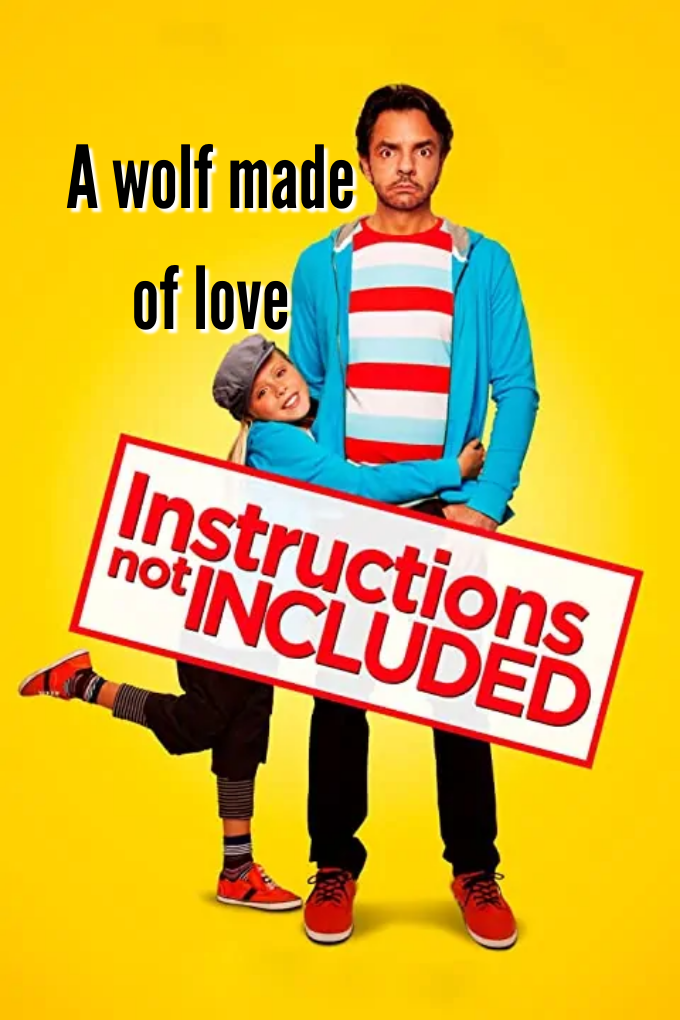
Provided by Lionsgate through the website Imdb, and modified by me on Canva.
In my eyes, this film has a message few others ever get to share, to love as long as you can and to put your whole heart into it, as most parents one way or another keep themselves from showing their love to their kids by thinking of "I can do say this later" or "we have time for this later". This line of thought is something that makes some parents struggle with parenthood, and this is something that has repercussions on the childhood of their kids.
I for example remember my dad avoiding hugs and any kind of demonstration of love to me for years I could track the exact number of times he told me that he loved me and count it with one hand, yet I see him showing my daughter with love as he plays with her once or twice per day and I think to my self that I'm somehow jealous of it, the father I remember it's not the grandfather she is having.
This happened because he held himself off from showing love to his kids, in the name of discipline, or so he said once when we were discussing it, but now as a father, I think it's not the discipline that held him back, but fear.
Fear that was born when my brother got cancer, that devastating fear of losing a child made him distance himself from us on an emotional level, I guess he did it to prepare for the horrible fate of losing my brother, yet that never happened, my brother got cured and the tender and caring father I remember at the age of five was gone for the rest of my life, and now that he doesn't have to live such fear, he is opening up to share time with my daughter as a grandparent.
Why is the message of this film something that relates so much to me? Because Instructions not included taught us to search for another way, instead of preparing for a loss and making a wall between us and our kids, if we ever know that we will lose a child, then the best way for us is to shower them with our hearts, open ourselves and show a boundless love for as long as we can.
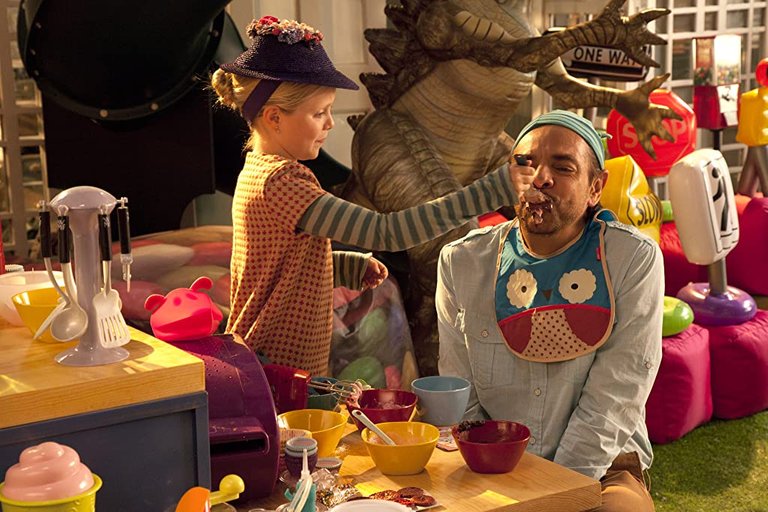
Provided by Imdb.
The love of a parent is what makes children feel safe and what allows them to grow and flourish, of course, there is also spoiling, and there is a fine line between spoiling and showing affection if you are not careful, I find no wrong in allowing ourselves to spoil them a bit because death could happen in any moment.
Mortality is something we are not usually aware of, people just don't think about it as something that could hit us at any moment and would change our families with ease, could be our parents, us, or our kids, and preferably in that order, but giving your child love should not be related to mortality in any way.
That is why I love so this film's work around such symbolism, when they introduced the "fear" in the form of a wolf in the film, they broke the line of what would be expected, as I found it odd because the wolf is not the symbol commonly used to represent fear.
The wolf is a famous symbol that represents Death, mortality, and the pack (family) so having these wolves multiply during the film as our main character's fears start to stack one over another, makes this symbolism special.

Provided by Imdb.
If we look into those wolves, we can figure out what each of them represents, the first wolf was the fear of death by falling into "la Quebrada", and the second wolf was the fear of compromise in other words, to add a woman into the "pack", the third was the fear of having a child or "pack" improved version and the fourth wolf is the fear of his daughter demise... So far, all of those wolves fit into the narrative of the film and can be interpreted in a way that fits into the traditional symbolism of wolves, but what about the wolf that takes a walk with Valentín at the end?
The last wolf represents a life with no pack (family), such life is filled with solitude and loneliness, and so it represents Valentín, this life of deep mortality that he is to endure until the pack is reunited on death, and they all could jump on the "Quebrada" together.
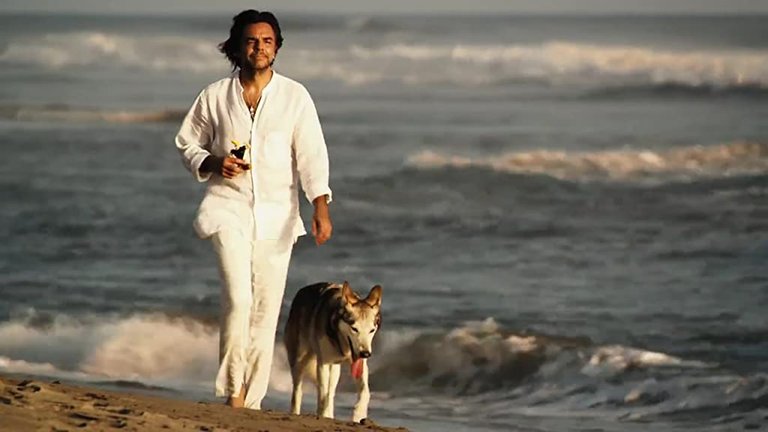
Provided by Imdb.
There is a popular saying "A Mother's Love Knows No Bounds" but I like to imagine this film is the counterpart of that saying as it shows us a boundless love of a father, something we don't often get to see in cinema or at least in most of Hollywood stories.
Most family films born out of western cinema usually focus on father-son relationships, and to achieve such a feat, they push aside all father-daughter moments, replacing any possible interaction with a mother-daughter one, making the female identity physically separated from men.
In this case, I'm glad that Instructions not included is not that kind of story, as they did a vudu switcheroo of the love represented in cinema and exchanged traits often portrayed as female to a male lead, and did the reverse as well, filling the character of Julie with negative traits that are mostly related to men as ditching the children to pursue dreams and that working drive to be somebody.
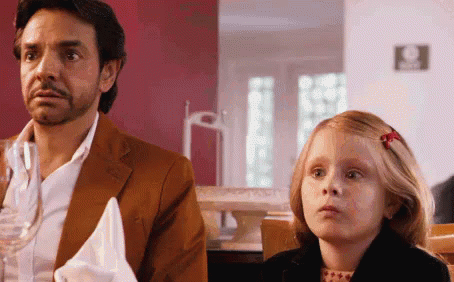
Provided by Tenor.
As a father, I find this kind of love to be impressive, just being able to see a father dutifully walking out of a whole country to give his daughter a bit more time in peace and innocence, It's something to look up to, but Valentín love for his daughter goes further than walking from the USA to Mexico.
Valentín took years of risks silently, keeping Maggie in the dark about her terminal disease, at the same time that he had a huge load of parenthood and education, being an ignorant man himself, he managed to do so at the same time that he lived a risky work-life, allowing Maggie to live a life that only could be described as a fantasy.
I could never forget this film as a father, because we are all supposed to do this and beyond, to find ways to support our kids as Valentín did, while keeping them from the cruelty of the outer world, like it happened with Maggie, Valentín's little girl, and yes, It might be a fiction story but it is a beacon of inspiration to all fathers in the audience.
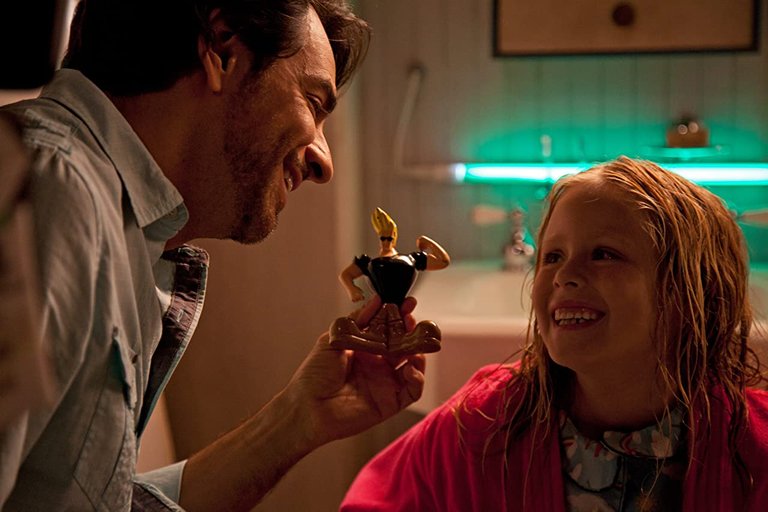
Provided by Imdb.
There is something else I want to point out about this film, the massive work of Eugenio Derbez as both the director and the main character was easy to notice, this film would have never worked if he dints directed it himself and build it around the character of Valentín and the concept of fatherhood, and that something I have to admire as a fellow father.
The way this film portrays fatherhood is something I have only seen in films like La vita è bella (Life Is Beautiful), but it has a flaw, Valentín as a character only shines because there is no Julie for the most of the film, and when she finally introduces herself into the plot, she is the main antagonist.
Motherhood and fatherhood are not interchangeable, and fatherhood should not just shine when motherhood is missing, I understand Valentín motives and situation in the film, but in my eyes, Maggie also needed a mother.
Even in the absence of motherhood, Valentín should have communicated a better version of Julie to Maggie, in my eyes Julie's search for redemption is something that we in society see too often in men, and it should be allowed for Julie as well as it should be fairer to her, redemption is deemed if it is wanted from the bottom of the heart.
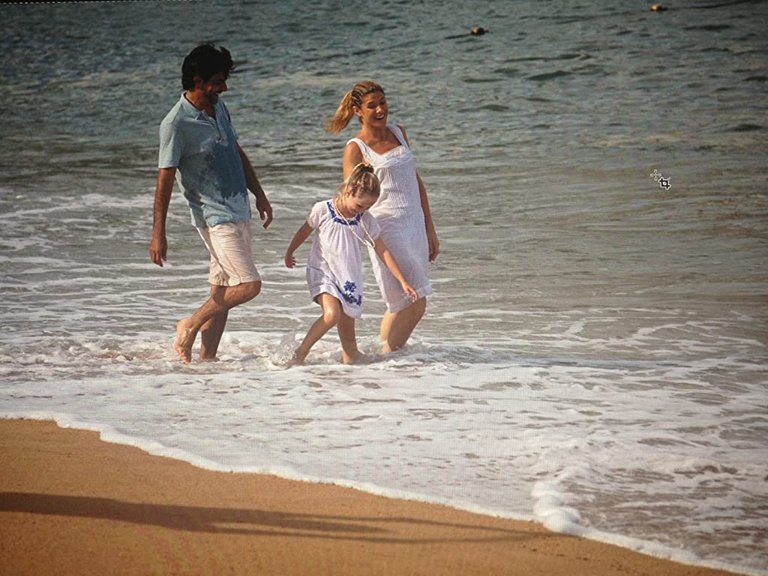
Provided by Imdb.
This film touches a special place in my soul, so I'm sorry if I didn't invite you into its world at the start like I always do, I knew it would be a bit too impersonal for what it would mean to me to write it as a father, a son, and a man, so I needed to just give in and do my best.
I hope you enjoyed the ride on Valentín's show of fatherhood and my reflections on it, What are your thoughts about parenthood? Do you consider Valentín decision as right? I read you in the comments section below.

¡Hola comunidad de Movies & TV Shows!
Miedo, ¿Hay algún miedo más grande que el miedo a perder a un hijo? "Instrucciones no incluidas" (2013) es una película mexicana cuyo nombre original es No se aceptan devoluciones, y si tuviera que resumir esta película en una frase, sería: "el miedo a perder un hijo manifestado en una gigantesca historia de amor", y eso seguiría siendo quedarse corto de lo grande que es este amor.
El amor no es algún tipo de justicia, propósito o misión, a veces tiene elementos de trabajo arraigados en él, especialmente durante la paternidad, pero al final de todo, el amor es un sentimiento de infinita ternura y cuidado, representado por hacer cosas buenas por otros, incluyendo el cuidado de sus necesidades y enseñanzas de tu corazón y ser un padre es un compromiso con dicho amor, ya que esta película es una prueba de cómo la paternidad puede ser en su mejor momento, claro en forma de cine me refiero, y me encanta esta película junto a su mensaje.
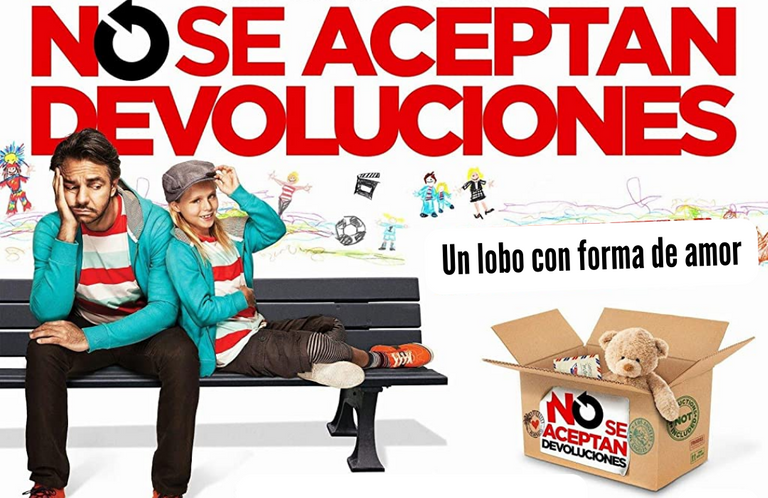
Poster promocional provisto por Lionsgate a traves del portal Imdb, modificado por mi en Canva.
En mi opinión, esta película tiene un mensaje que pocos llegan a compartir: Amar todo lo que se pueda y poner todo el corazón en ello, ya que la mayoría de los padres, de un modo u otro, se abstienen de mostrar su amor a sus hijos pensando en "puedo decir esto más tarde" o "tenemos tiempo para esto más tarde". Esta línea de pensamiento es algo que hace que algunos padres tengan dificultades con la paternidad y esto es algo que repercute en la infancia de sus hijos.
Yo por ejemplo recuerdo a mi padre evitando los abrazos y cualquier tipo de demostración de cariño hacia mi durante años, podría rastrear el número exacto de veces que me dijo que me quería y contarlo con una mano, sin embargo lo veo demostrándole cariño a mi hija mientras juega con ella (una o dos veces al día) y pienso para mis adentros que de alguna manera estoy celoso de ello, el padre que recuerdo no es el abuelo que ella está teniendo.
Esto sucedió porque él se contuvo de mostrar amor a sus hijos, en nombre de la disciplina, o eso dijo una vez cuando lo estábamos discutiendo, pero ahora como padre, creo que no es la disciplina lo que lo contuvo, sino el miedo.
Miedo que nació cuando mi hermano enfermó de cáncer, ese miedo devastador a perder un hijo le hizo distanciarse de nosotros a nivel emocional de tal forma que supongo lo hizo para prepararse para el horrible destino de perder a mi hermano; sin embargo eso nunca ocurrió, mi hermano se curó y el padre tierno y cariñoso que recuerdo a los cinco años se fue por el resto de mi vida, y ahora que no tiene que vivir ese miedo, se está abriendo a compartir tiempo con mi hija como abuelo.
¿Por qué el mensaje de esta película me afecta tanto? Porque No se aceptan devoluciones nos enseñó a buscar otro camino, en lugar de prepararnos para una pérdida y hacer un muro entre nosotros y nuestros hijos, si alguna vez sabemos que vamos a perder a un hijo, entonces la mejor manera para nosotros es bañarlos con nuestro corazón, abrirnos y mostrar un amor sin límites durante todo el tiempo que podamos disfrutar junto a ellos.

Provisto por Imdb.
El amor de unos padres es lo que hace que los niños se sientan seguros y lo que les permite crecer y florecer, por supuesto, también está el mimar; ademas que hay una delgada línea entre mimar y mostrar afecto si no se tiene cuidado, pero no encuentro nada malo el permitirnos mimarlos un poco porque la muerte podría suceder en cualquier momento.
La mortalidad es algo de lo que no solemos ser conscientes, la gente simplemente no piensa en ello como algo que nos puede golpear en cualquier momento y que cambiaría a nuestras familias con facilidad, podrían ser nuestros padres, nosotros o nuestros hijos, y preferiblemente en ese orden, pero dar cariño a tu hijo no debería estar relacionado con la mortalidad de ninguna manera.
Por eso me encanta tanto el trabajo de esta película en torno a ese simbolismo, cuando introdujeron el "miedo" en forma de lobo en la película, rompieron la línea de lo que sería de esperar, y eso me pareció extraño, porque el lobo no es el símbolo comúnmente utilizado para representar el miedo.
El lobo es un símbolo famoso que representa la Muerte, la mortalidad y la manada (familia), así que el hecho de que estos lobos se multipliquen durante la película a medida que los miedos de nuestro protagonista empiezan a apilarse unos sobre otros, hace que este simbolismo sea especial.
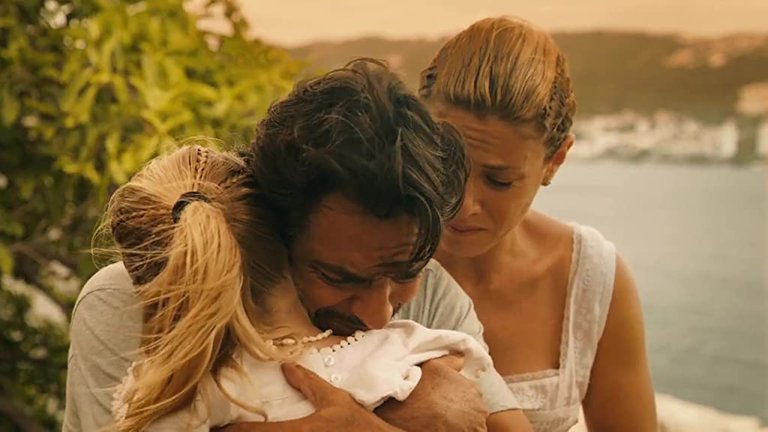
Provisto por Imdb.
Si nos fijamos en esos lobos, podemos averiguar lo que representa cada uno de ellos, el primer lobo era el miedo a la muerte al caer en "la Quebrada", y el segundo lobo era el miedo al compromiso en otras palabras, a añadir una mujer a la "manada", el tercero era el miedo a tener un hijo o "manada" en versión mejorada y el cuarto lobo es el miedo a la desaparición de su hija... Hasta aquí, todos esos lobos encajan en la narrativa de la película y pueden interpretarse de una forma que encaja en el simbolismo tradicional de los lobos, pero ¿Qué pasa con el lobo que se pasea con Valentín al final?
El último lobo representa una vida sin manada (familia), esa vida está llena de soledad y ausencias, y así representa Valentín esa vida de profunda mortalidad que ha de soportar hasta que la manada se reúna al morir y puedan todos saltar juntos desde la "Quebrada".

Provisto por Imdb.
Hay un dicho popular que reza "El amor de una madre no conoce límites", pero me gusta imaginar que esta película es la contrapartida de ese dicho, ya que nos muestra el amor sin límites de un padre, algo que no solemos ver en el cine o, al menos, en la mayoría de las historias de Hollywood.
La mayoría de las películas familiares nacidas del cine occidental suelen centrarse en las relaciones padre-hijo, y para conseguir tal hazaña, dejan de lado todos los momentos padre-hija, sustituyendo cualquier posible interacción por una madre-hija, haciendo que la identidad femenina se separe físicamente de la masculina.
En este caso, me alegro de que Instrucciones no incluidas no sea ese tipo de historia, ya que hicieron un cambio vudú del amor representado en el cine; intercambiaron rasgos a menudo retratados como femeninos a un protagonista masculino, e hicieron lo contrario también, llenando al personaje de Julie de rasgos negativos que se relacionan sobre todo con los hombres como abandonar a los hijos para perseguir sueños y ese deseo de ser alguien en la vida.

Provisto por Giphy.
Como padre, este tipo de amor me parece impresionante, el solo hecho de ver a un padre caminando obedientemente de un país a otro para darle a su hija un poco más de tiempo en paz e inocencia, es algo digno de admirar, pero el amor de Valentín por su hija va más allá de caminar de Estados Unidos a México.
Valentín asumió años de riesgos en silencio, manteniendo a Maggie en la oscuridad sobre su enfermedad terminal, al mismo tiempo que tenía una enorme carga de paternidad y educación, siendo él mismo un hombre ignorante, lo logró al mismo tiempo que vivía una vida laboral arriesgada, permitiendo a Maggie vivir una vida que sólo podría describirse como una fantasía.
Nunca podré olvidar esta película como padre, porque se supone que todos debemos hacer esto y más, encontrar formas de mantener a nuestros hijos como hizo Valentín, mientras los mantenemos alejados de la crueldad del mundo exterior, como ocurrió con Maggie, la pequeña de Valentín, y sí, puede que sea una historia de ficción, pero es un faro de inspiración para todos los padres del público.
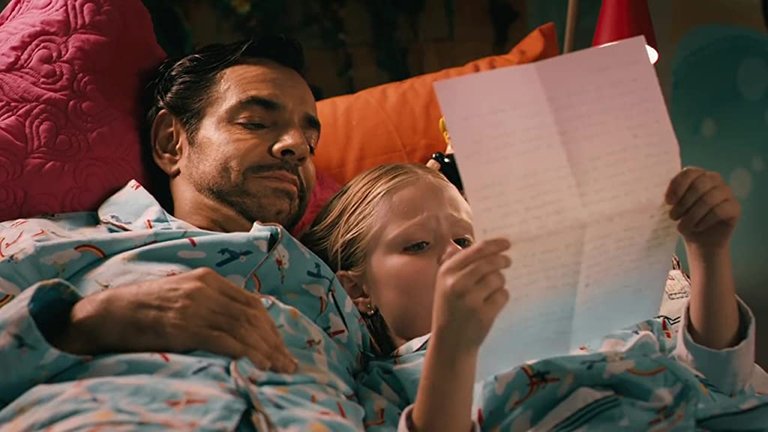
Provisto por Imdb.
Hay algo más que quiero destacar de esta película, el enorme trabajo de Eugenio Derbez tanto como director como protagonista fue fácil de notar, esta película nunca hubiera funcionado si él mismo no se hubiera limitado a dirigirla y construirla alrededor del personaje de Valentín y el concepto de la paternidad y eso es algo que tengo que admirar como compañero padre.
La forma en que esta película retrata la paternidad es algo que sólo he visto en películas como La vita è bella (La vida es bella), pero tiene un fallo, Valentín como personaje sólo brilla porque no hay Julie durante la mayor parte de la película, y cuando por fin se introduce en la trama, es la principal antagonista.
La maternidad y la paternidad no son intercambiables y la paternidad no sólo debe brillar cuando falta la maternidad, entiendo los motivos y la situación de Valentín en la película, pero a mis ojos, Maggie también necesitaba una madre.
Incluso en ausencia de la maternidad, Valentín debería haber comunicado una mejor versión de Julie a Maggie, a mis ojos la búsqueda de redención de Julie es algo que en la sociedad vemos demasiado a menudo en los hombres, y debería permitirse para Julie así como debería ser más justo para ella, la redención se considera real si se quiere desde el fondo del corazón.

Esta película toca un lugar especial en mi alma, así que siento si no les invité a su mundo al principio como siempre hago, sabía que sería demasiado impersonal para lo que significaría para mí escribirla este articulo, como padre, hijo y hombre, así que necesitaba ceder y hacerlo lo mejor posible.
Espero que les haya gustado el paseo por el espectáculo de la paternidad de Valentín y mis reflexiones al respecto, ¿Qué pensáis sobre la paternidad? ¿Consideras acertada la decisión de Valentín? Te leo en la sección de comentarios más abajo.
La fuente del separador entre inglés y español, Source basada en el material promocional del filme provisto por Imdb.

